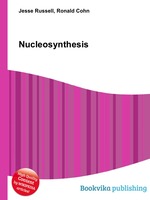Nucleosynthesis
Jesse Russell Ronald Cohn
бумажная книга
High Quality Content by WIKIPEDIA articles! Nucleosynthesis is the process of creating new atomic nuclei from pre-existing nucleons (protons and neutrons). It is thought that the primordial nucleons themselves were formed from the quark–gluon plasma from the Big Bang as it cooled below two trillion degrees. A few minutes afterward, starting with only protons and neutrons, nuclei up to lithium and beryllium (both with mass number 7) were formed, but only in relatively small amounts. Some boron may have been formed at this time, but the process stopped before significant carbon could be formed, because this element requires a far higher product of helium density and time than were present in the short nucleosynthesis period of the Big Bang. The Big Bang fusion process essentially shut down due to drops in temperature and density as the universe continued to expand. This first process of primordial nucleosynthesis was the first type of nucleogenesis to occur in the universe.


